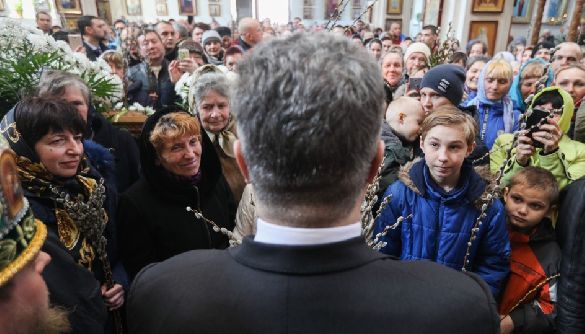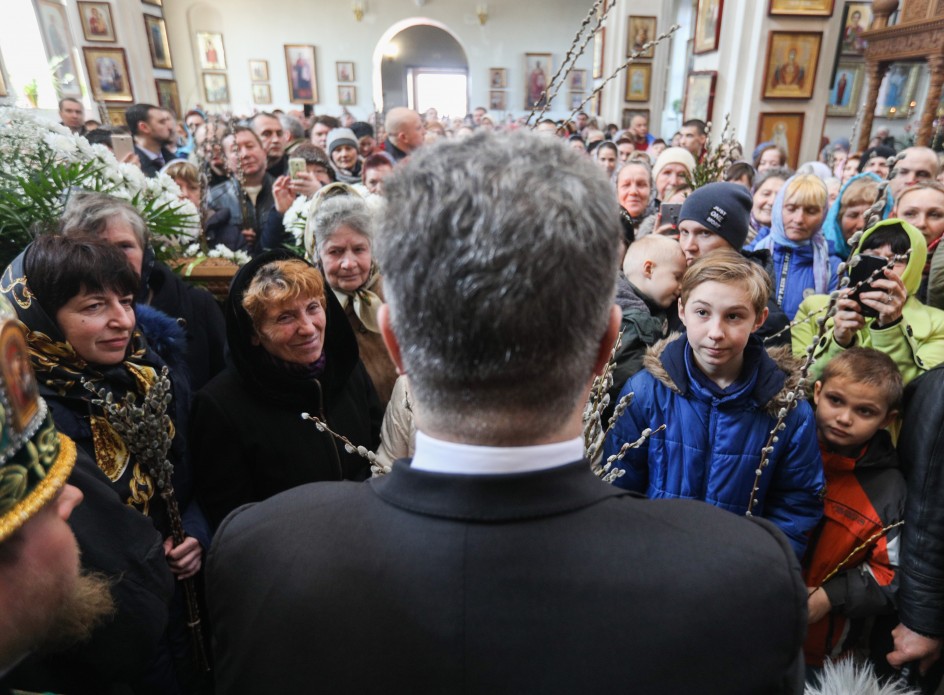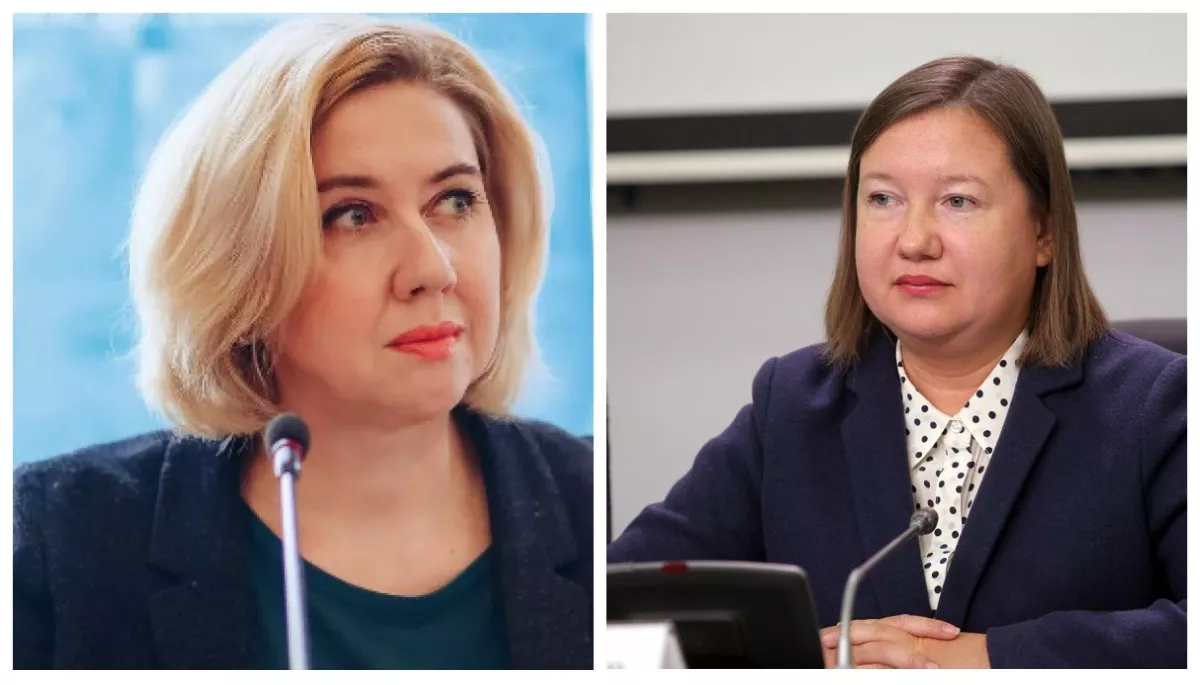
President has got upper hand over opponents
President has got upper hand over opponents


During March-April, 2018, monitoring of the government communication policy toward Donbas has detected such trends:
- President Petro Poroshenko paid as much attention to Donbas issues as any other Ukrainian politician. That forced the Opposition Bloc to launch a media offensive against president, criticizing his legislation about Donbas re-integration and transformation of the Anti-Terrorist Operation into the Joint Forces Operation;
- Minister of Interior Arsen Avakov made himself top news maker by presenting his vision of possible implementation of the peace resolution plan in Donbas. However, his highly controversial views toward Donbas population could undermine a peace process and popular trust toward government’s efforts;
- the fourth anniversary of the active military engagement in Donbas and the end of the fourth year of Poroshenko’s presidency could have inspired other frontrunners of the presidential elections to attack mistakes and shortcomings of the Poroshenko’s security and defence policies. While mocking president, Opposition Bloc, Batkivshchyna and Samopomich downgraded social issues of Donbas in their communication.
President getting busy with Donbas issues
In March-April an idea of sending peacekeeping UN troops to Donbas hase become the major message of the President’s communication about Donbas issues. Almost all reports about Poroshenko’s meetings and negotatiations with the representatives and heads of the foreign governments included mentions about urgency of the UN peacekeeping mission in Donbas (19 news).
In many cases president admitted Russia’s destructive role, particularly, sustained damages from aggression and necessity of maintaining international sanctions against Russia. It was done to strengthen impression that Ukraine remains serious about possible peace talks, which do not include concessions to Russia.
It is also worth mentioning that President’s communication showed balance between messages about role of the Armed Forces in the conflict (8 news) and government’s commitments to improve social conditions in the liberated areas and lives of the people, who had to stay in the occupied territories (7 news).
While visiting Luhansk (March 16) and Donetsk (April 1) regions Poroshenko again underlined his attitude toward citizens, who live in the occupied territories: “They are Ukrainians, our compatriots. And we shall regain Ukrainian land by peaceful means” (in Volnovakha, Donetsk region). In Zolote president showed his awareness about major concerns of the people, who live near the frontline and in the occupied areas.
However, his words about equipping checkpoints, school buses for children from the combat zone villages and mobile groups of doctors are far from reality. Opinion polls and focus groups revealed that people in Donbas, generally, are not satisfied with the social and economic conditions and government’s actions. Thus it seems that president has either to visit Donbas regularly to control how his orders executed or remove governors.
Nevertheless, we should say that after months of the formal references toward Donbas president demonstrated genuine interest in the regional issues. We will continue to follow whether it will result in genuine policy changes, considering absence of prime minister’s silence about Donbas.
Ministry of temporary occupied territories and internally displaced persons (MinTOT): continuing endless PR campaign
In March-April MinTOT produced numerous statements and news only to promote its head - minister Vadym Chernysh. Mr.Chernysh pretended to be politician and diplomat (Transitional administration must facilitate transfer of power from occupation administration to Ukraine, Russian strategic calculations in the global struggle are based on the three doctrines) rather than bureaucrat in charge of managing urgent issues he was appointed for.
Sometimes minister’s PR went too far by distorting reality. For instance, MinTOT reported that it “delivered 72 unique educational models to teach children how to behave in the mined areas”. As it appeared there were only 24 full packages of such models distributed among some schools of Donetsk and Luhansk regions, which means that only 24 schools received such items. Another example were news that “Government submitted draft legislation about enhancing protection of the IDPs rights”. However, this piece of legislation only amended notary proceedings about property in the occupied territories and freed IDPs from paying money for submitting their property claims to court. Indeed, these are important details but they are hardly “enhancement of the civil rights”. It seems that top management of MinTOT uses communication rather to show their achievements to higher authorities.
Ministry of Information Policy (MIP): following president and making precise commitments
In March-April MIP closely followed President’s media activity toward Donbas. Ministry released statement about “beginning of the countermeasures tackling anti-Ukrainian broadcasting in the zone of the Anti-Terrorist Operation” and reported that it “takes responsibility to provide full-scale broadcasting of the UA|TV in Donbas and Crimea”. However, minister Yuriy Stets did not specify exact terms of implementation of given promises. Therefore, we will track MIP actions toward these goals.
Also, we are going to look at how MIP will use result of the opinion poll in its communication campaigns in Donbas, since it was promised by first deputy minister Emine Dzhaparova.
Minister Avakov’s U-turn
In June 2017 minister of interior Arsen Avakov suggested “to think about strategy of a hybrid peace”, which was regarded as manifestation of the “hawkish” approach toward conflict resolution in Donbas. Then, in November 2017 he pronounced that “Minsk process is dead” and proposed “seven consequent steps” and “smart compromises” to end the war.
However, on April 16, 2018 minister Avakov, calling himself “a man strongly standing with both feet on the ground, involved in everyday hard routine”, shared his new ideas about “real mechanism of implementation” of a peace plan with the media.
Here are key points of minister Avakov’s plan:
- “the law on collaborators is a must, because we have to determine legal status of every person”. Avakov appealed to the post-war France experience, although that case was very different from the current conflict in Donbas. It is very suspicious that minister of interior a priori started to divide people living in the occupied territories using such controversial categories;
- “After Ukrainian official agencies return to liberated areas the local elections are held on the basis of the national legislation. I don’t care, who wins. I’m confident that the winners would be people with pro-imperial views, although in the strategic perspective that doesn’t matter”. Here we see direct controversy between minister’s statements. On April 7, 2018 at the press briefing in Severodonetsk Avakov stated: “We have poll results from the occupied territories that show there are 70% of the people who want to return to Ukraine. True, they have certain fears, they are brainwashed by Putin’s TV propaganda. However, these people feel thay would be better with Ukraine”. If majority of the people would like to stay with Ukraine why should they elect anybody with “pro-imperial views”. At the same time Avakov demonstrated his arrogance toward these people, since he disregards their choice, and this fact plays in hands of Russian propaganda that repeated that Ukrainian government would mistreat Donbas people;
- “People from the occupied territories shall be stripped off their rights to elect central bodies such as parliament and president. It is normal international practice…It was used in all post-conflict zones, including Spain after Franko regime and the post-war Balkans”. Here Avakov is simple wrong, since the Constitution of Ukraine directly prohibits to deny citizens their civil rights. It could be either Avakov’s legal illiteracy or calculated move to test public opinion about such controversial decision. However, we must admit that majority of Ukrainians thought about people in the occupied territories as hostages which make it improbable to accept such illegal proposal.
- “Ukrainian people, who lived under occupation, would applaud authorities after they will be given all welfare of the peaceful life”. In a nutshell, “Avakov plan” suggests to buy people’s loyalty with “welfare of the peaceful life”. However, this argument seems to be irrelevant, since both supporters of Ukraine and Putin’s loyalists cross line of contact to get their pensions in the liberated areas of Donbas. Thus it is hard to say what stands behind Avakov’s confidence but it looks like Russian propaganda of the better life in Crimea after annexation.
All in all, in the last ten moths minister Avakov performed remarkable U-turn, leaving behind hawkish rhetoric and adopting stance of the brand new seller of myths about quick peace resolution. The problem, although, are his stereotypes about people living in Donbas and their urgent needs. From this point of view, as we tried to argue above, his plan would fail rather sooner than later. Thus we will follow closely his future actions and communications.
First Vice Speaker of the parliament Iryna Herashchenko: balanced and high-precision statements
In March-April Iryna Herashchenko was balanced and specific while speaking about Donbas. She was the person who released news which showed that the government failed to accomplish its obligation and did not pay compensations to the hostages, released on December 27, 2017. Overall, Ms. Herashchenko communicated about hostages (5 reports), diplomatic talks with the western partners (5 reports) and Minsk talks (4 reports).
Herashchenko also mentioned IDP’s rights and urgent concerns of people living in Donbas. Although in both cases she released political statements, we consider it as an important contribution to raising public awareness about dire security and humanitarian situation in the region.
Donetsk Civil Military Administration: life improves or PR works?
In March-April Donetsk Governor Pavlo Zhebrivskyi actively communicated with specific target groups like teachers, entrepreneurs, IT engineers, inhabitants of the Donbas small towns and villages. Among his main messages was that he local self-government bodies were not able to cope with simple tasks, e.g. preparing coherent projects of reconstructing social communal services, therefore, local communities require permanent assistance and guidance from the Administration. Zhebrivskyi warned that he would not tolerated “poorly performed projects” and, as in case of Sloviansk, ordered mayor to keep strict timeframe for reconstruction of the city park.
While meeting common people Zhebrivskyi promised to lobby their interests at the central level and carefully informed that the positive changes happened due to the support of President: “President Poroshenko is personally involved in developing networks of healthcare facilities in the rural areas”
However, Donetsk governor did not change his one-way style of communicating with the people. He looks at the local population as passive audience looking for state paternalism and overlooking benefits of living in the liberated areas. Zhebrivskyi continued ignoring points of view that did not conform his own opinion.
Luhansk Civil Military Administration: More Promises Than Actions
Comparing with the previous months Luhansk governor Yuriy Harbuz has not changed form and substance of his communication with the people. In general, we noticed no less than 8 new promises: from calls to reinvigorate regional coal industry to endorsement of repair of the road leading to Stanitsa Luhanska. The only fresh news was about opening of the Center for Rehabilitation Care for Veterans of War in Rubizhne.
The growing number of promises in the context of few good news could be interpreted as a sign of possible policy changes, even perspective of removal of the governor. We will continue to look whether it is right or not.
Solidarnist VS Opposition Bloc: Is War Over?
In March-April the pro-presidential party and parliamentary faction of “Solidarnist” topped the list of the political forces who mentioned Donbas in their communication with 32 reports. Although the Opposition Bloc finished second with 28 reports, its communication was far more focused and coherent.
Solidarnist paid much attention to describing destructive role of Russia in Donbas (13 news) and the significance of the Ukrainian army protecting the region (5 reports). President’s party also talked about IDP’s rights (9 reports) including one report about people from the occupied territories (We have to approve mechanism of legal registration of the people, who live in the occupied territories - MP Tetiana Rychkova).
On the other hand, Solidarnist weakened its communicative efforts in support of the president’s foreign policy agenda (only 5 reports, including 2 about peacekeepers). That helped Opposition Bloc to hijack public attention to continue its campaign against President’s policies in Donbas: there were 10 reports positioning OB as the only party which wanted to achieve peace and 5 reports with criticism about beginning of the Joint Forces Operation in Donbas. At the same time, like Solidarnist, Opposition Bloc communicated less about Donbas regional problems (6 reports +2 about occupied Donbas territories) and IDP rights (5 reports).
It was very interesting to notice that in last months of 2017 and beginning of 2018 Opposition bloc tried to challenge and question President’s policy toward Donbas while Solidarnist massively reacted with its own messages endorsing their patron. However, in March-April both parties disengaged in the media front and focused on communicating with their core constituencies. For instance, the Opposition Bloc concentrated on attacking certain power high figures like Oleksandr Tuurchinov (accusing him in starting the war), prime minister Hroisman (blaming him for Donbas blockade) and ex-prime minister Arseniy Yatseniuk (for humiliating IDP pensioners)
Batkivshchyna: framing President as a scapegoat
In February Yulia Tymoshenko announced her original peace plan for Donbas. However, in March-April she did not released any details. Her opaque statement about necessity to respect Budapest memorandum security assurances and her party member’s promise “to develop new global concept of peace resolution for Ukraine” did not bring more clarity.
Meanwhile, Batkivshcheyna focused on personal accusations of the president Poroshenko for his inability to keep his promise “to finish war in two weeks”, his profiteering during the war and ineffective Minsk agreements.
It seems that Tymoshenko’s party decided to lure Donbas voters who trusted Poroshenko and but disappointed in his policies. However, we have to look whether Batkivshchyna has anything to win their trust back.
Samopomich: targeted criticism matters
As well as other political rival Samopomich concentrated on communicating with their core voters using Donbas topics. A lot of attention was given to the situation in the Armed Forces: Vice Speaker Oksana Syroiid blamed President for failure of the defense reform (during party conference and two times during preliminary council in the parliament in March and April. Another Samopomich MP Roman Semenukha accused government in incompetence and superficial measures (concerning support of schoolchildren from the occupied territories and legal registration of the inhabitants of the occupied territories).
However, it should be admitted that Samopomich did not propose any political alternative. Thus its statements were just political messages to the loyal constituencies who trust this party and do not care about situation in Donbas.
Photo: Press Service of the President of Ukraine












